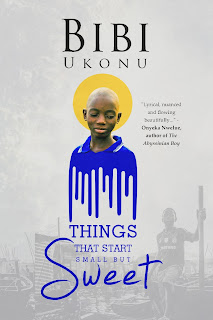It’s a beauty to have. And this is why 50% of my royalties will be donated to organizations that fight for the urban poor and neglected in Nigerian cities
BBR: Congratulations Binyerem, we are so happy to see a new book from you after quite a long wait. Last was THE WATER WAS HOT and now, THINGS THAT START SMALL BUT SWEET. We love your titles. There’s this sentence structure in them. Was there anything behind the long silence? And what’s your idea for sentence-like titles? Any definite reason for your choice?
Bibi: Thank you so much. I’m glad too. My silence? I gave up as a creative writer at a time. I thought it was time to face family, which remains more important to me. You know my kids are quite young, and I’ve always had this kind of idea about raising kids. I prioritize everything I do, and I decided it was not time for me to continue touring the world with books in my hands. I muted that part of my life to my gain. You know I’m also an architect, and then a facility manager with a multinational where I work daily. About my titles, there’s this thing I love about sentences. They capture the human soul. And because I was writing about characters that are poor and challenged in urban centers, I had no choice than to create a sentence as the title. I agree, it happened with my first book – The Water Was Hot. They all have their reasons. It is also happening in my next book which will be out in 2018.
Nigeria is a tough country. Be resilient.
BBR: One of the amazing things we noticed about THINGS THAT START SMALL BUT SWEET was the cover layout, the display of creative photography on the cover. We feel we just want to lay our hands on the book just because of the cover. Can you tell us something about the book we can hold unto? Novella? Novel? Poetry? Setting? Just anything.
Bibi: Let me be open now. The cover inspired every story in that book. How? (Laughs). I called Omoregie Osakpolor early this year, the Documentary Photographer. I said “Osas, give me some of your best images of Makoko. I want to write a book.” It actually sounds funny because I just had three good stories then. But I needed twelve stories, one story for each month of the year. When Osas sent the images, I immediately knew what I wanted. And I went to Fred Martins and said “Make me a very creative cover design.” He did. And then I started writing and visiting waterfront settlements. I learned many things; few of Egun/Gunuvi words, food, traditions, names and many things that two beautiful Egun people took their time to teach me and my crew. You know I’ve written a lot of renowned articles about the sufferings of these urban poor people and how they’re are not included in the benefits of the citizens of the mega city. So, THINGS THAT START SMALL BUT SWEET is a collection of twelve short tales that are about the lives of the people and how they survive as a happy community, constantly intimidated by the government they elected to govern them. These stories do not come as the stereotyped tales we hear about sufferings and all. They come as happiness, as struggles, and as victories of different shades. They’re stories I’m passionate about. And the book also exhibits different images of the waterfront people, by Omoregie Osakpolor, and one of my beautiful poems as well. It’s a beauty to have. And this is why 50% of my royalties will be donated to organizations that fight for the urban poor and neglected in Nigerian cities, such as Justice and Empowerment Initiatives.
BBR: Independent publishing or traditional ?
Bibi: I did not wait to be chosen. I chose myself. Griots Lounge only publishes traditionally. We have titles like BONFIRES OF THE GODS by Andrew Oki, launched 2013 at The British Library London, THE LOUDEST SILENCE I HAVE EVER HEARD by Jideofor Aluka (a collection of well edited poems), THE WATER WAS HOT by Binyerem Ukonu (first published by Serene Woods India) and now my new book, all published traditionally by Griots Lounge with agreed royalties. I am the Managing editor, while Jideofor Aluka is the Publisher. I signed myself. We are reorganizing to invest in good manuscripts by new authors.
BBR: Do you also think young writers are laid behind or see their creativity dwindle while looking for traditional publishers that never come?
Bibi: New writers are not stopped by anyone. I believe they should just keep writing. There’s enough space.
BBR: What are the major issues your book focused on?
Bibi: People. My book focuses on real people.
BBR: You are a father, a family man, and we wonder how you combine all the stress with writing. What makes these combinations smooth for you?
Bibi: It’s not smooth (laughs). It’s never smooth. Sometimes I leave the house after midnight to my “holy of holies”, a place I find peace to write because I must write about many things. Luckily, I live in Bonny Island, in a quiet estate where you only hear the sound on the tumbling waters of the ocean and chirping of night birds. These things help me to write. But I have to leave the house or kill the fun and laughter at home. So, I usually choose the first. And they all understand, especially now that they’re growing up. They even read whatever I write. And there’s always constant electricity to do all these.
BBR: You are an architect, who runs a magazine on urban architecture. Do you find a way to infuse architecture into your writing in any way?
Bibi: Oh yes! It’s dotted all over the book, especially my love for sustainable and urban development. My book grows with the city, especially Lagos.
BBR: Who and who would you call your best writers?
Bibi: I have writers I love. I’m not sure it’s because of what they have written. But I just love them because I always feel this connection with them. And they’re always very supportive of my works. I chose them male and female; E.C. Osondu and Chika Unigwe. I love these two great authors.
BBR: What would you think need to change in the literary industry in Nigeria, or nothing, Nigeria is doing so well?Bibi: The stories are there. Just heal the distribution network. We need to embrace technology and apply it to sales. My books are at Amazon worldwide. As soon as you order, it is printed by Amazon and sent to your address. My royalties are properly accounted for, and I’m paid as soon as I reach my threshold and request to be paid. I do not have books packed in my house, waiting to be sold. Amazon sells one copy after the other. And fortunately don’t give free copies to friends and family. We need Amazon, or anything close to it to set up in Nigeria. Our readers will take us more seriously, and young writers that are scared will easily find their market. We will have more books. In January 2018, copies of my new book will arrive Nigeria for the Nigerian launch. I am receiving the number I know I can sell off through major bookstores.
BBR: What would be your advice to younger Nigerian writers everywhere, who are reading this, who are writing, who are coming.
Bibi: Nigeria is a tough country. Be resilient.
You can click on the link to order TTSSBS – Things that Start Small but Sweet on Amazon



